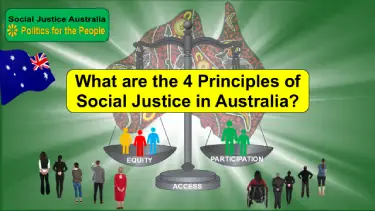Description
Discover the 4 principles of social justice in Australia — equity, access, participation, and rights—and how Australia can achieve a fairer society.
Introduction: The Diminishing Foundations of Social Justice in Australia
Social justice is a cornerstone of any society striving for fairness and equality. In Australia, the four key principles of social justice—equity, access, participation, and rights — have long been championed as pathways to a more compassionate and ethical society. However, the rise of neoliberal economic policies has steadily eroded these principles, favouring corporate profits over public welfare.
As Australia owns monetary sovereignty, it has the unique ability to use its financial resources to create a just society. Yet, the country continues to face growing inequality, limited access to essential services, and a political system increasingly dominated by corporate interests.
In this article, we will explore each of these four principles, examine how neoliberalism undermines them, and suggest pathways for reclaiming these values to promote a just and inclusive Australia.
Understanding the 4 Principles of Social Justice
Australia’s commitment to social justice rests on four core principles: equity, access, participation, and rights. Each of these principles plays a critical role in creating a society where every individual could thrive, regardless of their background or socioeconomic status.
1. Equity refers to providing individuals with the resources they need to reach comparable outcomes. It acknowledges that some people require more support than others to achieve fairness.
2. Access ensures that everyone can obtain essential services, such as healthcare, education, and housing, regardless of their income or social standing.
3. Participation advocates for the involvement of all citizens in political and social decision-making processes.
4. Rights guarantees that all individuals can claim their fundamental human entitlements, from freedom of speech to access to shelter and safety.
The Principle of Equity in Australia
What is Equity in Social Justice?
Equity is often confused with equality, but the two concepts are fundamentally different. While equality assumes everyone should receive the same resources, equity recognizes that people have unique needs. To achieve fairness, resources must be distributed in ways that help bridge disparities, such as the gaps between wealthy and low-income citizens.
In Australia, the principle of equity faces significant challenges due to economic policies that favour the wealthy. Neoliberalism, with its emphasis on deregulation, privatization, and reduced government intervention, has widened the gap between the rich and the poor. As of 2024, the top 20% of Australians hold over 60% of the nation’s wealth, while the bottom 20% struggle to make ends meet .
How Neoliberalism Undermines Equity

Neoliberal policies have made equity difficult to achieve in Australia. The emphasis on tax cuts for high-income earners and corporations has limited public revenue, reducing the government’s ability to invest in social programs that could help level the playing field. For example, recent cuts in welfare support and the privatization of essential services have disproportionately affected low-income Australians. Neoliberalism, by prioritizing market efficiency over social outcomes, reinforces a system that rewards wealth accumulation over collective well-being.
Restoring Equity through Australia’s Monetary Sovereignty
Australia, as a currency sovereign nation, can fund programs that support equity. The government can issue its own currency, allowing it to fund universal public services, welfare programs, and infrastructure that bridge economic gaps without the constraint of “balancing the budget.” Progressive taxation and increased public spending on social services such as healthcare, education, and affordable housing are essential to restoring equity.
The Principle of Access
What Does Access Mean in Social Justice?
Access refers to the ability of all individuals to obtain vital resources, such as healthcare, education, and housing. It ensures that services are available to everyone, not just to those who can afford them. In Australia, access is critical for supporting a cohesive society where all citizens could lead fulfilling lives.
How Neoliberalism Limits Access to Essential Services
Neoliberal policies have led to the increasing privatization of services that were once publicly funded and accessible to all. As services like healthcare and education become privatized, access is increasingly decided by income. Australians with lower incomes often find themselves unable to afford the rising costs of private education and healthcare. In 2023, out-of-pocket healthcare costs reached a record high, with many Australians forgoing necessary medical treatments due to financial constraints .
Education has also suffered under neoliberal policies, with public schools receiving less funding compared to private institutions. This shift has created a two-tiered system where those who can afford private education receive higher-quality services, while others are left with underfunded public alternatives.
Ensuring Universal Access to Public Services
To reverse this trend, Australia must re-invest in public services and ensure that access is based on need, not income. This can be achieved by increasing public funding for healthcare, education, and housing and regulating the private sector to prevent exploitative practices. Australia’s monetary sovereignty enables it to fund these initiatives without financial constraints. By redirecting resources towards public welfare, the government can guarantee that all citizens have access to the services they need to thrive.
The Principle of Participation
Why Participation Matters in Social Justice
Participation is the ability for all citizens to have a say in the decisions that affect their lives. It is a fundamental democratic principle that ensures every voice is heard, regardless of economic or social status. Genuine participation empowers individuals and communities to contribute to societal progress.
Corporate Interests Eroding Public Participation
Unfortunately, participation is under threat in Australia. Neoliberalism, by fostering corporate dominance over political processes, has marginalized ordinary citizens. Political lobbying and donations from large corporations have distorted policymaking, often prioritizing corporate interests over public welfare. This has resulted in political decisions that help the wealthy elite while disenfranchising the broader population.
A 2023 report by the Australia Institute found that corporate donations to major political parties exceeded $100 million, raising concerns about the influence of money on public policy . As a result, the voices of ordinary Australians are often drowned out by those with significant financial power.
Revitalizing Democratic Participation in Australia
To ensure meaningful participation, political reform is essential. Australia must impose stricter regulations on political donations and lobbying to reduce corporate influence. Additionally, more participatory mechanisms, such as citizen assemblies and direct democracy initiatives, can be introduced to ensure that all Australians have a say in the decisions that shape their lives. Public engagement in policymaking must be prioritized to restore trust in the democratic process.
The Principle of Rights
Understanding Rights in Social Justice
Rights refer to the basic human entitlements that all individuals should have access to, including the right to life, freedom, and security. In Australia, rights encompass various aspects such as freedom of speech, access to housing, and the protection of Indigenous land rights.
How Australia’s Policies Fail to Protect Rights
Despite international commitments to uphold human rights, many of Australia’s policies fall short, particularly in housing and Indigenous land rights. The ongoing housing crisis has left thousands of Australians homeless, with inadequate government intervention to address the issue. The National Housing Finance and Investment Corporation reported that in 2023, over 116,000 Australians were experiencing homelessness .
Indigenous Australians have seen their land rights ignored or overridden in favour of corporate interests. The mining industry, often supported by government policies, continues to encroach on Indigenous land without proper consultation or compensation, violating the rights of Indigenous communities.
Strengthening Human Rights Protections
Australia must prioritize the protection of human rights, especially for vulnerable groups. The government can strengthen legal frameworks to safeguard Indigenous land rights and provide adequate funding for public housing projects. Additionally, greater accountability mechanisms must be introduced to ensure that human rights are upheld in all areas of policy. Australia’s monetary sovereignty can play a crucial role here, allowing the government to distribute resources towards strengthening human rights protections without financial constraints.
Conclusion: Reclaiming Social Justice in Australia
Australia’s four principles of social justice—equity, access, participation, and rights—are essential to creating a fair and inclusive society. However, neoliberal policies have eroded these values, prioritizing corporate profits over public welfare. By recognizing and using Australia’s monetary sovereignty, the government can reverse these trends and create a society where social justice is at the forefront of policymaking.
Restoring equity through progressive taxation, ensuring universal access to essential services, revitalizing democratic participation, and strengthening human rights protections are all achievable goals. Australia must take bold action to reclaim its commitment to social justice, ensuring a fairer future for all citizens.
Question for Readers
How do you think Australia can better uphold the principles of social justice in today’s political and economic climate?
Call to Action
If you found this article insightful, share it on social media and join the discussion on how we can create a more just Australia. Visit our website for more articles on social justice and political reform.

